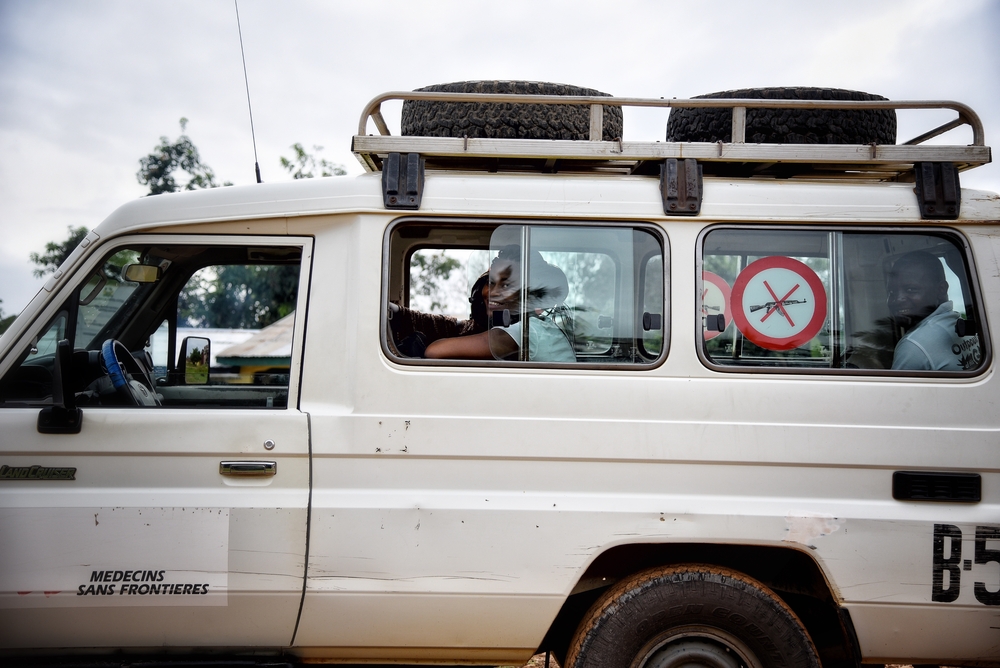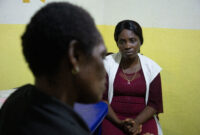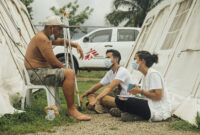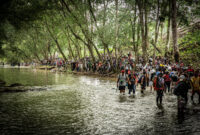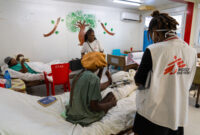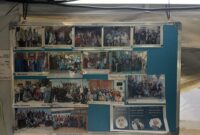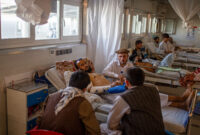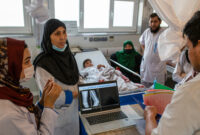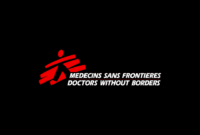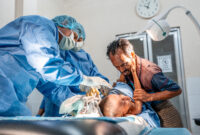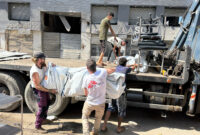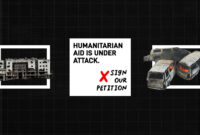Sierra Leone: Living through epidemics and expanding in challenging times
“When COVID-19 came I was very nervous. I thought it would be another Ebola, which was a death sentence,” says 45-year-old Ira Jonson. Ira was heavily involved in the logistics of the response to the 2014-2016 Ebola outbreak in Sierra Leone.
During that time, he met a pregnant woman who was sick with Ebola at the Ebola centre where he was working. She was always in his thoughts because they spoke the same Mende language and she was in a serious condition. He managed to convince her to seek medical care at the centre.
However, it was too late and, sadly, she died a few days later. “After we buried her, her husband thanked all of us, marked his wife’s grave with a cross and left,” says Ira. “I felt I had let her down.”
Sierra Leone was still recovering from Ebola and a decade-long civil war that ended in 2002 and when the COVID-19 pandemic began, it is currently struggling to overcome a third wave of the virus. Doctors Without Borders/Médecins Sans Frontières (MSF) has been providing medical care in Sierra Leone since 1986 and continues to adapt and expand its projects to meet the growing needs in the country.
MSF’s first medical project in Sierra Leone was in response to a cholera outbreak. Now, our teams monitor the spread of different diseases, including COVID-19, and MSF is part of the case management and surveillance group at the Sierra Leone Emergency Operations Centre.

MSF currently runs medical projects in three districts, Kenema, Tonkolili and Bombali, helping the Ministry of Health and Sanitation to provide general and specialist healthcare. In Kenema, in eastern Sierra Leone, MSF’s activities are focused on children under five, pregnant women and lactating mothers.
Curable and preventable, but still deadly
The outbreaks and years of civil war have severely weakened Sierra Leone’s health system. Children are affected by malaria, malnutrition, diarrhea and skin diseases. These diseases that are no longer a medical issue in countries with developed health systems. Rehabilitating this sector is a high priority for MSF to reduce deaths among child and new or expecting mothers.
The medical needs of children are vastly greater than the available resources in this region. The numbers of children who die in their early years has remained high for the last 10 years.
Across all age groups, malaria is the country’s single biggest killer, accounting for 38 percent of hospital admissions in Sierra Leone. The disease itself is curable if diagnosed early it and can be treated by a trained community health worker. However, for many, reaching medical care remains a significant challenge. Parents bear the burden of not being able to afford the medical care and infected children suffer the consequences.
“Child and maternal mortality rates are exceptionally high in Sierra Leone, but we are working to lower them through our support of the Ministry of health and Sanitation,” says Whitney Ward, MSF head of mission in Sierra Leone.
Uninterrupted medical care
Hangha hospital provides medical care to children under five through an emergency room, an intensive care unit and two general paediatric wards. There is also a therapeutic feeding centre where malnourished children are cared for. All these services are complemented by a central laboratory, X-ray and a blood bank.
Between March 2019 and the end of end of 2020, the hospital treated over 24,361 patients affected by various conditions, including malaria, pneumonia, malnutrition and severe diarrhea.
The hospital continues to grow the services it provides to patients. Currently, a team of more than 90 workers and architects is building a new maternity ward, with two operating theatres for complicated deliveries and a neonatal unit. The new ward will bring the total hospital capacity up to 160 beds.
As Kenema district is still not 100 percent covered by the national electricity grid, MSF runs the hospital using a hybrid electric system of solar energy and diesel generators. In the future, we plan to fully run the hospital with clean energy.
Linking remote villages to Hangha hospital
“Today I will be crossing Sewa river by the ferry to reach my patients’ in the Wandor and Simbaru chiefdoms. The ferry is bit slow, but eventually I will reach them,” says MSF outreach nurse Saffiatu Timbo.
In Sierra Leone, 60 to 65 percent of people live in rural areas. Some are in remote, hard to reach villages. MSF outreach teams are delivering medical care directly to people in their villages to address medical issues such as malaria, diarrhea and pneumonia. The outreach teams provide community-based medical care in 25 villages in the Wandor, Nongwa and Simbaru chiefdoms, in Kenema district, through 10 local health units set up in these areas.

“People face serious obstacles to access medical care; sometimes it’s the high cost of transportation or medications,” says Olga EM, MSF Medical Coordinator. “Some villages are too far away from health centres and people can’t access adequate healthcare.”
From ensuring consistent supplies of essential drugs, to medical consultations, child vaccinations and health facility rehabilitations, our health promotion teams are providing education sessions in remote villages on malaria prevention and treatment.
The MSF Academy for Healthcare
MSF’s role in Sierra Leone goes beyond providing mother and child care.
Sierra Leone needs more skilled, qualified health workers to help improve the services provided in general and specialist health facilities, and to deliver effective responses during emergencies like outbreaks and natural disasters.
Between 2014 and 2015, during the Ebola outbreak, hundreds of healthcare workers died. Staffing for healthcare facilities remains a critical challenge in delivering quality medical care to people.

In Sierra Leone, the MSF Academy for Healthcare initiative focuses on strengthening the skills and competencies of medical professionals providing paediatric care in MSF’s Hangha hospital.
“Investing in healthcare workers has a direct impact in the quality of care provided to Sierra Leonians,” says Chloe Widdowson, MSF Academy learning manager in Sierra Leone.
So far, 110 nurses and 58 clinical health officers have been enrolled in the Academy’s training programmes in Kenema. In addition, Ministry of Health staff working in different community health centres have been enrolled in an outpatient program that will help them to provide quality healthcare in the long term.
The MSF Academy for Healthcare is reinforcing the local capacity by setting up a collaboration with the Nurses and Midwives Board. The Academy will welcome groups of nursing teachers for training in mentoring and facilitating skills. They will have access to all of the Academy’s electronic learning resources, including handouts, learning games, session plans, simulation scenarios, films and learning journals.
We are currently pursing accreditation status with the Sierra Leone Nurses and Midwives Board. “The official accreditation will enhance academic status of participants studying in our academy and will encourage them and boost their motivations,” says Victor Siroky, MSF Academy representative.
